M. Allen Cunningham's Blog, page 17
March 27, 2013
Prime Passages: Dublinesque by Enrique Vila-Matas, and Ben Okri (impromptu)
from Vila-Matas's Dublinesque:“He dreams of the day when the spell of the best-seller will be broken, making way for the reappearance of the talented reader, and for the terms of the moral contract between author and audience to be reconsidered. He dreams of the day when literary publishers can breathe again, those who live for an active reader, for a reader open enough to buy a book and allow a conscience radically different from his own to appear in his mind. He believes that if talent is demanded of a literary publisher or writer, it must also be demanded of a reader. Because we mustn’t deceive ourselves: on the journey of reading we often travel through difficult terrains that demand a capacity for intelligent emotion, a desire to understand the other, and to approach a language distinct from the one of our daily tyrannies. … The same skills needed for writing are needed for reading. Writers fails readers, but it also happens the other way around and readers fail writers when all they ask of them is confirmation that the world is how they see it.” (New Directions, 2012; p.51)Ben Okri, speaking at the World Writers Festival in Edinburgh, 2012:“My brothers and sisters in Africa, we feel that our stories have still not been told. We feel that the form of the telling of those stories has not yet been found and articulated and evolved in a way that, as it were, can be appreciated round the world. We feel that the novel is still very young. … I seem to be hearing about the exhaustion of the novel. I find that very puzzling, personally. Because I think that the novel is only 350 years old. It’s not as old as painting. It’s not as old as sculpting. And as an art form itself, I think maybe the real future of the novel lies with the fact that we, the writers, have not issued the fundamental challenge to the perception of the novel as a form. What do I mean by that? In almost all the other forms—in music, and certainly in art—the narrative tradition, the naturalistic tradition of painting, has been superseded by abstract, by many other kinds of media. And I think that we have accepted too much, as it were, the definition of the limitation of the novel. I think the real challenge is to change the form of the novel in terms of how we read it. I still think that we accept too much the beginning, middle, end. Even where we have experiments, we have not managed, as it were, the kind of Duchampian change of game. I feel that the novel is not dead yet. I just feel like I’m at a funeral here, really. I feel like speaker after speaker has given a kind of oration to the end of the novel, as if the novel has yet begun to express all the different possibles, all the different ways in which reality can be expressed. I don’t think that reality is as homogenous as that. I think each person carries within them a special way of seeing and perceiving reality, and I think that’s what the novel does. The novel constantly challenges us to say that the way that we’re told that the world is, is not the way the world is. The world is much more mysterious than that, is much more elusive than that, and is much more magical and more challenging, and possibly even more fragmented. I just would like to propose that we talk about where we can go as novelists, where we can go as writers, and whether we accept the fact that we are really totally determined by the marketplace, which I don’t accept.” (Okri's remarks are transcribed from the dazzling 2-hour discussion on "the Future of the Novel," involving 50 authors from all over the world, which can be viewed in its entirety here.)
Published on March 27, 2013 23:50
March 25, 2013
Forthcoming
Herewith, a low-fi trailer for my third novel, The Silent Generations.
NB: This was created for the exclusive viewing of indie booksellers around the country, to whom I mailed a pre-contractual galley (PCG) of the novel. Thus, the cover shown is for the PCG only. The Silent Generations, being still "forthcoming," does not yet have a cover.
NB: This was created for the exclusive viewing of indie booksellers around the country, to whom I mailed a pre-contractual galley (PCG) of the novel. Thus, the cover shown is for the PCG only. The Silent Generations, being still "forthcoming," does not yet have a cover.
Published on March 25, 2013 16:49
Did You Just Call Me a "Content Container"?
The amazing Melville House blog gets better and better. For a few years now I’ve greatly appreciated their relentless resistance to the civic and cultural irresponsibility, rapacity, and general megalomania of Amazon.
Now we all owe further thanks to Melville House, and to their blogger Dustin Kurtz, for brilliantly resisting “the propagation of [a] powerful and quite dangerous idiocy, the irruption of the language of venture capital into the province of the book.”Kurtz cites Tim Sanders, of the “team publishing” website NetMinds, speaking to the New Yorker: “We believe a writer is not necessarily a writer. They are content containers.” And Peter Armstrong, founder of Leanpub, who states: “a book is a startup” and who equates the long, solitary process of writing to the “stealth mode” that precedes an entrepreneurial launch.NetMinds and Leanpub both aim to provide writers (via social network) with early audience critiques of works in progress, in order to maximize the mass appeal/profitability of those works; i.e., to help the writer “pivot until you have the right book and build traction once you do.”
Welcome, Ladies and Gentlemen, to the brave new world of book-via-virtual-focus-group, where the sins of idiosyncrasy, subjectivity, or good old-fashioned style are, if not expurgated altogether, then "remixed" to the mercenary end of mass appeal. (I’ve touched on aspects of this subject elsewhere. See: “There’s a Crowd on My Desk” or "Why It's Desirable to Be Eccentric".) Kurtz:
“The general effect of increasing commercialization and of the compulsion to sell ever larger and larger quantities of a few books to a public which does not really care about them, must surely be that the position of the writer who writes as well as he possibly can ‘to please himself’, becomes less tenable. … The American malady is a spiritual one, the commercialization of spiritual goods on an enormous scale, in the same way as material goods are commercialized. … In the country where culture is ‘sold’ enormously, it is sold as something other than culture and tends to become something else in the process.”The slogans and euphemisms that characterize what I recently heard dubbed "dot-communism" are the latest symptoms of our long-standing American malady. Kurtz beautifully articulates what's at stake when we embrace such ways of talking about creativity:
Now we all owe further thanks to Melville House, and to their blogger Dustin Kurtz, for brilliantly resisting “the propagation of [a] powerful and quite dangerous idiocy, the irruption of the language of venture capital into the province of the book.”Kurtz cites Tim Sanders, of the “team publishing” website NetMinds, speaking to the New Yorker: “We believe a writer is not necessarily a writer. They are content containers.” And Peter Armstrong, founder of Leanpub, who states: “a book is a startup” and who equates the long, solitary process of writing to the “stealth mode” that precedes an entrepreneurial launch.NetMinds and Leanpub both aim to provide writers (via social network) with early audience critiques of works in progress, in order to maximize the mass appeal/profitability of those works; i.e., to help the writer “pivot until you have the right book and build traction once you do.”
Welcome, Ladies and Gentlemen, to the brave new world of book-via-virtual-focus-group, where the sins of idiosyncrasy, subjectivity, or good old-fashioned style are, if not expurgated altogether, then "remixed" to the mercenary end of mass appeal. (I’ve touched on aspects of this subject elsewhere. See: “There’s a Crowd on My Desk” or "Why It's Desirable to Be Eccentric".) Kurtz:
“[Armstrong] talks about the ‘success’ of a book. What he means is that the book pays out. Many publishers might agree with that standard, but how many authors? And that phrase ‘stealth mode?’ Are we to the point where the act of being alone, writing to an imagined audience and not a real responsive audience is akin to hiding?
“As for the real winners, the claims that made me actually clench my teeth and take a deep breath when I read them—Armstrong and his phrase about creativity, Sanders and that terrible terrible terrible sentence about ‘content containers’ what’s to be said? Anyone who could think such things is quite specifically part of The Problem in the starkest sense.”For me, all this brings to mind these words of Stephen Spender, written back in 1949:
“The general effect of increasing commercialization and of the compulsion to sell ever larger and larger quantities of a few books to a public which does not really care about them, must surely be that the position of the writer who writes as well as he possibly can ‘to please himself’, becomes less tenable. … The American malady is a spiritual one, the commercialization of spiritual goods on an enormous scale, in the same way as material goods are commercialized. … In the country where culture is ‘sold’ enormously, it is sold as something other than culture and tends to become something else in the process.”The slogans and euphemisms that characterize what I recently heard dubbed "dot-communism" are the latest symptoms of our long-standing American malady. Kurtz beautifully articulates what's at stake when we embrace such ways of talking about creativity:
“These guys are not harmful, as I say, but the spread of this type of jargon is. Language shapes, language is, thought, and the more comfortable we grow talking about nascent books as ‘content’, about drafts as ‘iterations’, the more we trivialize those books that don’t benefit from focus groups. These guys, this language, is hurting literature by changing how we think about books in general. It is a spreading disregard, not even conscious or apt enough to be malign. And I don’t think it likely to stop.”Read the Melville House post here. And consider adding the Melville House blog to your list of essential web-reading.
Published on March 25, 2013 16:26
March 20, 2013
Scribbles
1. Last spring I picked up this copy of Dillard's Pilgrim at Tinker Creek for around a dollar and a half. Only when I got home did I discover the former owner's inscription inside. As an exhibit of a peculiarly enduring stylistic mode that might be dubbed 'Teen-Scourge,' it caused me such absurd delight that I believe it's worth sharing. (NB: If you happen to have small children at hand, you may wish to refrain from reading aloud.)
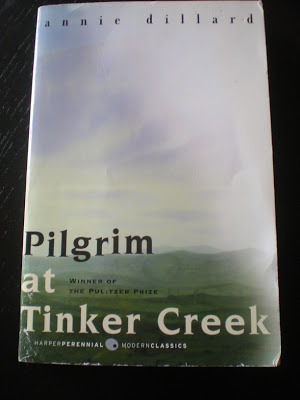
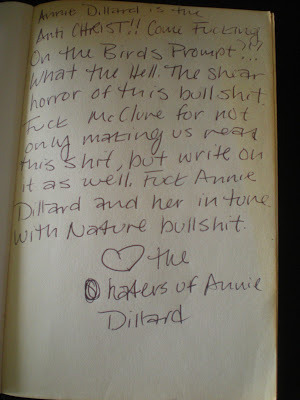
"Annie Dillard is the anti CHRIST!! Come Fucking On the Birds Prompt?!? What the Hell. The shear (sic) horror of this bullshit. Fuck McClure for not only making us read this shit, but write on it as well. Fuck Annie Dillard and her in tune with Nature bullshit. [heart] the haters of Annie Dillard" 2. A recent purchase of Six Nonlectures by e.e. cummings included the bonus, on the book's final page, of an autobiographical prose meditation in a style emulating cummings' own syntactical eccentricities -- and making explicit reference, in at least a few places, to the content of the book. As book-scribbling goes, here's an entry on a more epic scale than 'Teen-Scourge.' What to make of both of these entries? Maybe the weird readerly proximity they offer is an end in itself. The transcribed outrageousness of 'Teen-Scourge,' the vulnerability of the scribble, the messy, unguarded reflexivity of the thoughts -- these are yet a few more things e-books cannot give us.
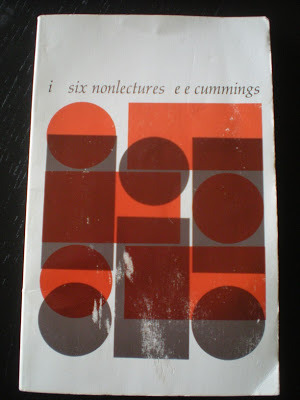
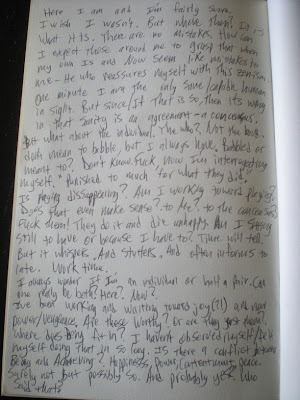 "Here I am and I'm fairly sure I wish I wasn't. But where then? It is what it is. There are no mistakes. How can I expect those around me to grasp that when my own Is and Now seem like mistakes to me -- he who reassures myself with this Zen-ism. One minute I am the only sane/capable human in sight. But since/if that is so, then it's wrong in that sanity is an agreement -- a consensus. But what about the individual. The Who? Not the band. don't mean to babble, but I always have. Babbled or meant to? Don't know. Fuck, now I'm interrogating myself. "Finished too much for what they did." Is playing disappearing? Am I working toward playing? Does that even make sense? to Me? to the consensus? Fuck them! They do it and die unhappy. Am I sitting still to have or because I have to? Time will tell. But it whispers. And stutters. And often informs to late [sic]. Work time. "I always wonder if I'm an individual or half a pair. Can one really be both? Here? Now? "I've been working and waiting toward joy (?!) and now power/vengeance. Are these worthy? Or are they just them? Where does Being fit in? I haven't observed myself/felt myself doing that in so long. Is there a conflict between Being and Achieving? Happinesss [sic], Power, Contentment, Peace. Surely not but possibly so. And probably yes? Who said that?"
"Here I am and I'm fairly sure I wish I wasn't. But where then? It is what it is. There are no mistakes. How can I expect those around me to grasp that when my own Is and Now seem like mistakes to me -- he who reassures myself with this Zen-ism. One minute I am the only sane/capable human in sight. But since/if that is so, then it's wrong in that sanity is an agreement -- a consensus. But what about the individual. The Who? Not the band. don't mean to babble, but I always have. Babbled or meant to? Don't know. Fuck, now I'm interrogating myself. "Finished too much for what they did." Is playing disappearing? Am I working toward playing? Does that even make sense? to Me? to the consensus? Fuck them! They do it and die unhappy. Am I sitting still to have or because I have to? Time will tell. But it whispers. And stutters. And often informs to late [sic]. Work time. "I always wonder if I'm an individual or half a pair. Can one really be both? Here? Now? "I've been working and waiting toward joy (?!) and now power/vengeance. Are these worthy? Or are they just them? Where does Being fit in? I haven't observed myself/felt myself doing that in so long. Is there a conflict between Being and Achieving? Happinesss [sic], Power, Contentment, Peace. Surely not but possibly so. And probably yes? Who said that?"


"Annie Dillard is the anti CHRIST!! Come Fucking On the Birds Prompt?!? What the Hell. The shear (sic) horror of this bullshit. Fuck McClure for not only making us read this shit, but write on it as well. Fuck Annie Dillard and her in tune with Nature bullshit. [heart] the haters of Annie Dillard" 2. A recent purchase of Six Nonlectures by e.e. cummings included the bonus, on the book's final page, of an autobiographical prose meditation in a style emulating cummings' own syntactical eccentricities -- and making explicit reference, in at least a few places, to the content of the book. As book-scribbling goes, here's an entry on a more epic scale than 'Teen-Scourge.' What to make of both of these entries? Maybe the weird readerly proximity they offer is an end in itself. The transcribed outrageousness of 'Teen-Scourge,' the vulnerability of the scribble, the messy, unguarded reflexivity of the thoughts -- these are yet a few more things e-books cannot give us.

 "Here I am and I'm fairly sure I wish I wasn't. But where then? It is what it is. There are no mistakes. How can I expect those around me to grasp that when my own Is and Now seem like mistakes to me -- he who reassures myself with this Zen-ism. One minute I am the only sane/capable human in sight. But since/if that is so, then it's wrong in that sanity is an agreement -- a consensus. But what about the individual. The Who? Not the band. don't mean to babble, but I always have. Babbled or meant to? Don't know. Fuck, now I'm interrogating myself. "Finished too much for what they did." Is playing disappearing? Am I working toward playing? Does that even make sense? to Me? to the consensus? Fuck them! They do it and die unhappy. Am I sitting still to have or because I have to? Time will tell. But it whispers. And stutters. And often informs to late [sic]. Work time. "I always wonder if I'm an individual or half a pair. Can one really be both? Here? Now? "I've been working and waiting toward joy (?!) and now power/vengeance. Are these worthy? Or are they just them? Where does Being fit in? I haven't observed myself/felt myself doing that in so long. Is there a conflict between Being and Achieving? Happinesss [sic], Power, Contentment, Peace. Surely not but possibly so. And probably yes? Who said that?"
"Here I am and I'm fairly sure I wish I wasn't. But where then? It is what it is. There are no mistakes. How can I expect those around me to grasp that when my own Is and Now seem like mistakes to me -- he who reassures myself with this Zen-ism. One minute I am the only sane/capable human in sight. But since/if that is so, then it's wrong in that sanity is an agreement -- a consensus. But what about the individual. The Who? Not the band. don't mean to babble, but I always have. Babbled or meant to? Don't know. Fuck, now I'm interrogating myself. "Finished too much for what they did." Is playing disappearing? Am I working toward playing? Does that even make sense? to Me? to the consensus? Fuck them! They do it and die unhappy. Am I sitting still to have or because I have to? Time will tell. But it whispers. And stutters. And often informs to late [sic]. Work time. "I always wonder if I'm an individual or half a pair. Can one really be both? Here? Now? "I've been working and waiting toward joy (?!) and now power/vengeance. Are these worthy? Or are they just them? Where does Being fit in? I haven't observed myself/felt myself doing that in so long. Is there a conflict between Being and Achieving? Happinesss [sic], Power, Contentment, Peace. Surely not but possibly so. And probably yes? Who said that?"
Published on March 20, 2013 15:39
March 12, 2013
Letterpress Business Cards!
Because Old-Fashioned is the new New!
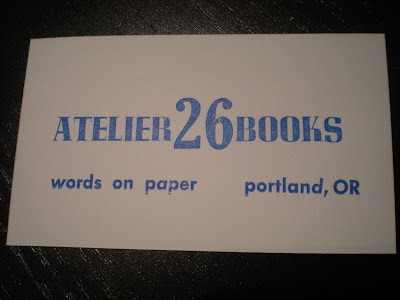
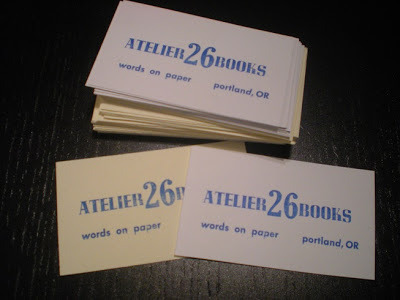 Created on a Kelsey tabletop press with reflex blue ink. Typeset in Corvinus Bold 24 pt, Cheltenham Bold 72 pt, and Spartan Heavy 14 pt (with accidental italics!)
Created on a Kelsey tabletop press with reflex blue ink. Typeset in Corvinus Bold 24 pt, Cheltenham Bold 72 pt, and Spartan Heavy 14 pt (with accidental italics!)

 Created on a Kelsey tabletop press with reflex blue ink. Typeset in Corvinus Bold 24 pt, Cheltenham Bold 72 pt, and Spartan Heavy 14 pt (with accidental italics!)
Created on a Kelsey tabletop press with reflex blue ink. Typeset in Corvinus Bold 24 pt, Cheltenham Bold 72 pt, and Spartan Heavy 14 pt (with accidental italics!)
Published on March 12, 2013 11:41
February 25, 2013
"More Normal Than Other People"
The video below is an elegant mini-documentary expedition into writer Duncan Fallowell’s book-cluttered flat in upper-class London.
"I can’t stop acquiring books,” says Fallowell. “But I’m not guilty about it. It’s a kind of necessity. Books, to me, are like oxygen. I’m a fish swimming in an aquarium of the intellect. … The books demanded to be incorporated into my domestic world.”
It’s a beautiful little film, and greatly enjoyable viewing. The YouTube précis, though, is curiously inaccurate, describing Fallowell’s collection as a "library which has spilled over into every available space and become an art installation in its own right." Fallowell has a lot of books, sure, but by all appearances it amounts to nothing like, say, the apartment that houses Brazenhead Books in New York – and Fallowell’s is hardly the helter-skelter hoard of a kook. To imply that the abundance of titles signifies, in its own right, a form of eccentricity is peculiarly dispiriting. Fallowell himself seems to resist the implication at one point:
"One does need grounding in the physical world. This is why the electronic book means nothing to me. Because a book is a physical object too. And writing, to me, is a physical act. It’s a sculptural act as well as an intellectual act. The two come together. … Do you think writers are odd? I don’t know. I don’t subscribe to this idea that you’ve got to be odd to be a writer…. Perhaps you’ve got to be more normal than other people.”
Having steadily built my own home library over the last several years, I wish to happily count myself among such ‘normals.’ And I’m delighted to spot, among Fallowell’s volumes, a number of my own fondest: On Grief and Reason and Watermark by Joseph Brodsky; David Marr’s life of Patrick White; and Leon Edel’s towering biography Henry James.
Fallowell: “There’s something about the lushness, the richness, the open-door quality of a book. Open a book and you’re opening a door. All these books just remind me of worlds beyond worlds and they are an expression of freedom. As we know, the first thing dictators do is control books, control what people are allowed to read. … I’ve always wanted to wander, and I can wander very conveniently in my library…"
"I can’t stop acquiring books,” says Fallowell. “But I’m not guilty about it. It’s a kind of necessity. Books, to me, are like oxygen. I’m a fish swimming in an aquarium of the intellect. … The books demanded to be incorporated into my domestic world.”
It’s a beautiful little film, and greatly enjoyable viewing. The YouTube précis, though, is curiously inaccurate, describing Fallowell’s collection as a "library which has spilled over into every available space and become an art installation in its own right." Fallowell has a lot of books, sure, but by all appearances it amounts to nothing like, say, the apartment that houses Brazenhead Books in New York – and Fallowell’s is hardly the helter-skelter hoard of a kook. To imply that the abundance of titles signifies, in its own right, a form of eccentricity is peculiarly dispiriting. Fallowell himself seems to resist the implication at one point:
"One does need grounding in the physical world. This is why the electronic book means nothing to me. Because a book is a physical object too. And writing, to me, is a physical act. It’s a sculptural act as well as an intellectual act. The two come together. … Do you think writers are odd? I don’t know. I don’t subscribe to this idea that you’ve got to be odd to be a writer…. Perhaps you’ve got to be more normal than other people.”
Having steadily built my own home library over the last several years, I wish to happily count myself among such ‘normals.’ And I’m delighted to spot, among Fallowell’s volumes, a number of my own fondest: On Grief and Reason and Watermark by Joseph Brodsky; David Marr’s life of Patrick White; and Leon Edel’s towering biography Henry James.
Fallowell: “There’s something about the lushness, the richness, the open-door quality of a book. Open a book and you’re opening a door. All these books just remind me of worlds beyond worlds and they are an expression of freedom. As we know, the first thing dictators do is control books, control what people are allowed to read. … I’ve always wanted to wander, and I can wander very conveniently in my library…"
Published on February 25, 2013 11:27
February 16, 2013
Essayist Orange Deserves Your Attention
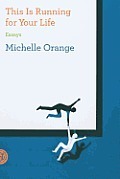
In this weekend's Oregonian is my review of Michelle Orange's brilliant essay collection This Is Running for Your Life , a new book that deserves the attention of anybody remotely interested in the life of the mind.
From the review:
... Michelle Orange models an ideal balance of firsthand engagement with -- and grounded criticism of -- the lightheaded culture all around us. "The new American dream," she writes, "is to build a really bitching personal brand, and the result of all that tap dancing on all those individual platforms is a pervasive kind of narrative decadence. We race to consume and regurgitate the hour's large and small events for each other like patricians in a postmodern vomitorium -- to know them first, translate them into bitter capsule form fastest, and be shocked or stirred or perceived as in any way less than totally savvy about these things the least. Even within our self-contained realities we become dulled to what's real and what's not, and further desensitized to what lies behind our fellow performers' virtual scrims." Here and elsewhere in the book, Orange's insights share their probing, persuasive rhythms with those of Susan Sontag, whose name rightfully comes up a number of times.
In the stunning chapter "Pixelation Nation," which takes its cue from Sontag's hallmark 1977 book On Photography, Orange explores the scarcely considered implications of digital imagery and dissemination in a time when every smartphone, iPad and iPod is a camera which, "with its promise of perfect recall, both reminds and relieves the shooter of the burden of being present." As we each become daily -- not to mention hourly -- publishers of images we've captured and edited for immediate upload, the images themselves take on "more of a social than a subjective or individual purpose." Our pictures have become part of a larger, ongoing self-publicizing project: "It's more about representing a certain reality than remembering it."
It's this kind of unfailingly X-ray-like inquiry into the peculiarities of our ultra-mediated world that unites Orange's 10 absorbing essays. Where Sontag's work generally took literature as the hub of its radial concerns, Orange proves herself an eloquent revealer of things more broadly socio-cultural and, as it happens, patently bizarre -- though they're the very things we refer to as "daily life." ...[continue reading here]
Published on February 16, 2013 17:44
February 13, 2013
"No Accountant Can Calculate Its Value"
"To ask why people need culture is in fact identical to asking why a human being is a human being.” -- Václav Havel
A characteristically visionary speech by Havel from 2009. At a mere thirteen minutes long, there's hardly any excuse for not listening to this man's indispensable insights.
Published on February 13, 2013 18:17
New Prose Poem in Print
The current issue of
Pear Noir!
, just out, includes my prose poem "Interview with a Recluse." Here's a scrap:
... He said he’d long wanted to understand the innocence that can carry a lie, the dark lines laid down to claim ownership, identity, to create a principality and the readiness to die for it. He believed he could understand hate. The soldier came to hate at some level the comrade entrenched beside him. You hated because you wanted to love. Because the prospect of loss was a ruthless constant. Nations were no different, societies. What you hated were the unnatural constructs — the country you were dying and killing for. And you hated the natural constraints — isolating desert, seas, constriction of the mother tongue and the home religion. These made love impossible. The strangulated need to love grew into hate, until you believed you could love a nation, a theory, and kill for it. ...
Published on February 13, 2013 08:52
December 26, 2012
Prime Passage: E.B. White on Christmas in 1949, The New Yorker
“Christmas in 1949 must compete as never before with the dazzling complexity of man, whose tangential desires and ingenuities have created a world that gives any simple thing the look of obsolescence — as though there were something inherently foolish in what is simple, or natural. The human brain is about to turn certain functions over to an efficient substitute, and we hear of a robot that is now capable of handling the tedious details of psychoanalysis, so that the patient no longer need confide in a living doctor but can take his problems to a machine, which sifts everything and whose ‘brain’ has selective power and the power of imagination. One thing leads to another. The machine that is imaginative will, we don’t doubt, be heir to the ills of the imagination; one can already predict that the machine itself may become sick emotionally, from strain and tension, and be compelled at last to consult a medical man, whether of flesh or of steel. We have tended to assume that the machine and the human brain are in conflict. Now the fear is that they are indistinguishable. Man not only is notably busy himself but insists that the other animals follow his example. A new bee has been bred artificially, busier than the old bee. “So this day and this century proceed toward the absolutes of convenience, of complexity, and of speed. . . Man’s inventions, directed always onward and upward, have an odd way of leading back to man himself, as a rabbit track in snow leads eventually to the rabbit. It is one of his more endearing qualities that man should think his tracks lead outward, toward something else, instead of back around the hill to where he has already been; and it is one of his persistent ambitions to leave earth entirely and travel by rocket into space, beyond the pull of gravity, and perhaps try another planet, as a pleasant change. He knows that the atomic age is capable of delivering a new package of energy; what he doesn’t know is whether it will prove to be a blessing. This week, many will be reminded that no explosion of atoms generates so hopeful a light as the reflection of a star, seen appreciatively in a pasture pond. It is there we perceive Christmas — and the sheep quiet, and the world waiting.”
Published on December 26, 2012 23:09



